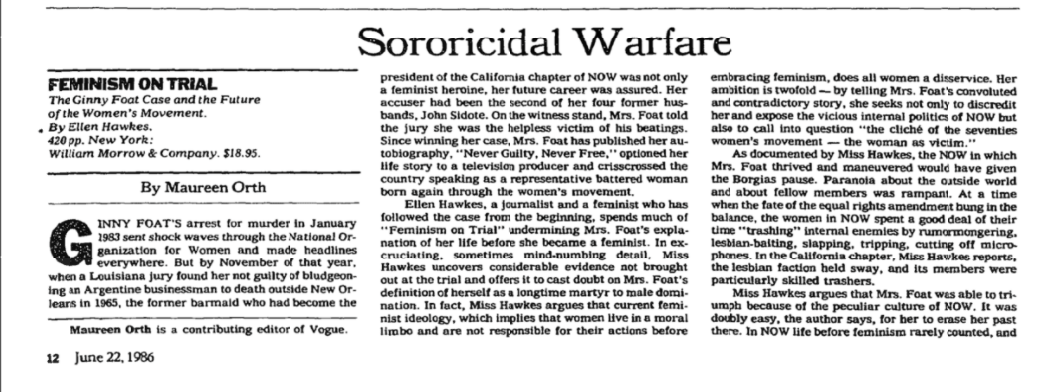Original Publication: New York Times, June 22, 1986
FEMINISM ON TRIAL The Ginny Foat Case and the Future of the Women’s Movement. By Ellen Hawkes. 420 pp. New York: William Morrow & Company. $18.95.
GINNY FOAT’S arrest for murder in January 1983 sent shock waves through the National Organization for Women and made headlines everywhere. But by November of that year, when a Louisiana jury found her not guilty of bludgeoning an Argentine businessman to death outside New Orleans in 1965, the former barmaid who had become the president of the California chapter of NOW was not only a feminist heroine, her future career was assured. Her accuser had been the second of her four former husbands, John Sidote. On the witness stand, Mrs. Foat told the jury she was the helpless victim of his beatings. Since winning her case, Mrs. Foat has published her autobiography, ”Never Guilty, Never Free,” optioned her life story to a television producer and crisscrossed the country speaking as a representative battered woman born again through the women’s movement.
Ellen Hawkes, a journalist and a feminist who has followed the case from the beginning, spends much of ”Feminism on Trial” undermining Mrs. Foat’s explanation of her life before she became a feminist. In excruciating, sometimes mind-numbing detail, Miss Hawkes uncovers considerable evidence not brought out at the trial and offers it to cast doubt on Mrs. Foat’s definition of herself as a longtime martyr to male domination. In fact, Miss Hawkes argues that current feminist ideology, which implies that women live in a moral limbo and are not responsible for their actions before embracing feminism, does all women a disservice. Her ambition is twofold – by telling Mrs. Foat’s convoluted and contradictory story, she seeks not only to discredit her and expose the vicious internal politics of NOW but also to call into question ”the cliche of the seventies women’s movement – the woman as victim.”
As documented by Miss Hawkes, the NOW in which Mrs. Foat thrived and maneuvered would have given the Borgias pause. Paranoia about the outside world and about fellow members was rampant. At a time when the fate of the equal rights amendment hung in the balance, the women in NOW spent a good deal of their time ”trashing” internal enemies by rumormongering, lesbian-baiting, slapping, tripping, cutting off microphones. In the California chapter, Miss Hawkes reports, the lesbian faction held sway, and its members were particularly skilled trashers.
Miss Hawkes argues that Mrs. Foat was able to triumph because of the peculiar culture of NOW. It was doubly easy, the author says, for her to erase her past there. In NOW life before feminism rarely counted, and in California, where personality reinvention is almost a given, backgrounds were never checked or inquired about, even by old friends. While serving as the treasurer of the Los Angeles chapter of NOW in 1977, Mrs. Foat had been arrested when Mr. Sidote charged that she had committed two murders, one in Nevada, one in Louisiana. Despite having spent three months in jail while she unsuccessfully fought extradition to Nevada (Mr. Sidote eventually refused to testify against her there when advised his testimony would not assure him leniency) and without even checking whether the Louisiana warrant for her arrest was still extant, Mrs. Foat could still launch a campaign for the national vice presidency of NOW in 1982. Rather than face the authorities to clear up the matter, she had a paper prepared on battered women to hand out to the press. MRS. FOAT might never have been arrested at all a second time (on the Louisiana charge) had she not been betrayed by a former close friend in NOW, Shelly Mandell, who told Miss Hawkes she agreed with others who thought Mrs. Foat was on ”a power trip.” It was Shelly Mandell – who insisted she only wanted to appoint Mrs. Foat to a local governmental board – who secretly wrote to Louisiana authorities and alerted them to Mrs. Foat’s identity. At the time, Shelly Mandell and her close friend Elaine Lafferty were feuding with Mrs. Foat and her close friend Kay Tsenin.
Significantly, Shelly Mandell and Elaine Lafferty were also with Mrs. Foat on the night she broke down sobbing and confided to them about her life with Mr. Sidote. Those present told Miss Hawkes that Mrs. Foat described in great detail her life after running away with him from her hometown of New Paltz, N.Y., and never once mentioned she was a battered woman. Rather, Miss Hawkes says, they implied her attitude was that she ”could give as good as she got.” What really upset her was the memory of having had to clean blood out of a car one night in New Orleans. When asked where she thought the blood was from, Mrs. Foat is reported to have said: ”I didn’t know. I didn’t think about it.” Not everyone believed her.
By the time of her trial in 1983 at the age of 42, Mrs. Foat had secretly borne a child and given it up for adoption, married four times, once without bothering to divorce Mr. Sidote first, taken up with a man who was murdered while Mr. Sidote was in jail, started a catering business, learned politics and fought her way through the warring factions of NOW. Yet, as one juror described her, she presented herself as a ”helpless little lamb.” Feminism, so important to her current life, was never once mentioned at the trial, and her lawyers were terrified she might be adopted as a lesbian cause. On the witness stand, she could recall nothing about the night of the murder, the same night she had so graphically described to her former friends several months before.
Miss Hawkes makes her case, but she is not able to write about it well. Narrative flow, metaphor and even physical description are overwhelmed by research and repetitious analysis. There is a rich and tawdry tale here, but it constantly gets interrupted. Having so painstakingly piled up the information, Miss Hawkes seems to feel compelled to give it all to us – long quotes from past and present NOW leaders, Gloria Steinem’s view that Mrs. Foat was like a political hostage and the griping of a feminist journalist who believes that she was too easy on Mrs. Foat.
The real weakness of ”Feminism on Trial” is that Miss Hawkes had almost no access to Mrs. Foat herself. Thus the reader is left with the same conclusion as the jury foreman who was amazed by the forceful woman he saw on television, declaring herself a symbol for all womankind, just hours after she had played the winsome victim in the courtroom: ”Seeing her on television, I wanted to tell people, ‘Hey, we found Ginny Foat not guilty, we didn’t find her innocent.’ Ever since then I’ve had to wonder, who is the real Ginny Foat?” FEMINISM AS A HAVEN Reading a newspaper one morning in January 1983, Ellen Hawkes first learned of Ginny Foat and was captivated by a story that had all the elements of a sordid novel.
As a professor of literature and women’s studies, she was intrigued as soon as she read the headline. ”It sounded like ‘Sister Carrie’ redone in California and brought to life in the feminist movement,” said Miss Hawkes, who taught at Stanford and Boston Universities before leaving academia to write full time at her Cape Cod home. ”Plus,” she said on the telephone recently, ”there was the overriding question of whether feminism was a haven from their pasts for people like Ginny Foat. My hunch was that this would be a case where all these ideas would be raised.”
She ”jumped on a plane,” she said, headed out to California for Mrs. Foat’s extradition hearing, then followed the trial to its conclusion in New Orleans.
From the very start of her research, however, Miss Hawkes had to grapple with a difficult question: Will this book hurt the women’s movement? ”There was a definite tension within myself whether this would come back to haunt me or feminism,” she said. ”But I soon began to see that the case was a lot more complicated than the symbolism. The rhetoric ran roughshod over reality.”
She said she hopes the book will, in fact, ”reinvigorate” feminism. ”I see the movement going stale,” she said. ”The ideology of the 70’s will not appeal to women of the 80’s. If you have to say you’re a victim, like Ginny Foat, before you can become a feminist, then the movement won’t attract young women.” – Esther B. Fein




No Comments